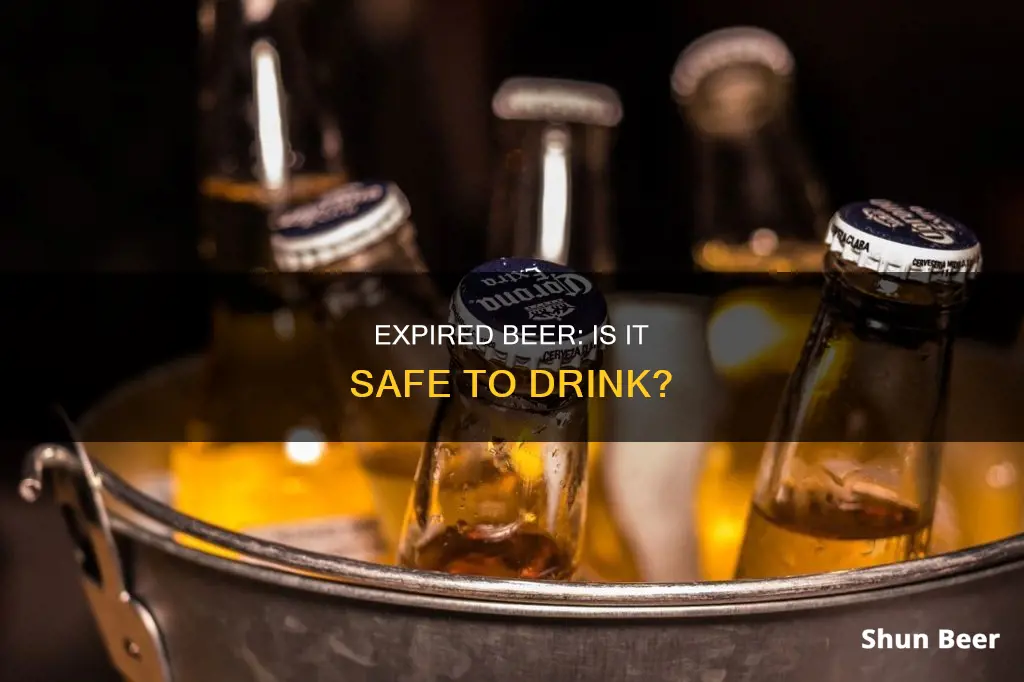
Drinking expired beer is generally safe, but it might not be very pleasant. Beer doesn't expire in the same way that other foods and drinks do, because the alcohol content and the presence of hops prevent the growth of pathogens. While it's unlikely to make you sick, the flavour of expired beer will degrade over time, becoming flat and malty or vinegary.
| Characteristics | Values |
|---|---|
| Safety | Drinking expired beer is generally safe, but there is a small chance of harmful pathogens developing. |
| Taste | Expired beer will likely taste unpleasant, flat, or overly sweet. |
| Aroma | The aroma of expired beer will likely be affected, with volatile compounds from hops dissipating. |
| Fizziness | Expired beer may lose its fizz, indicating that the seal was broken at some point. |
| Vinegary Taste | A vinegary taste may indicate bacterial growth, and the beer should be discarded. |
| Mould | Mould can grow in beer, especially if the bottle or can was dirty during packaging or poorly sealed. |
| Storage | Beer should be stored in a cool, dark place, preferably a refrigerator, to slow oxidation and ageing. |
| Shelf Life | Beer typically lasts 5-9 months beyond the expiration date at room temperature and up to 2-3 years in a refrigerator. |
What You'll Learn

It's unlikely to make you sick
Drinking expired beer is unlikely to make you sick. Beer is a perishable product that stales when exposed to light, oxygen, and heat, which degrade the organic compounds that make beer smell and taste great. However, even when its flavour is declining, it can be perfectly safe to drink.
The fermentation process used in brewing beer, as well as its low pH level and alcohol content, make beer an unfriendly environment for microorganisms. Even if a beer sits on the shelf for years, as long as it's sealed, it's unlikely to make you sick. Beer has already been treated to eliminate any potentially harmful bacteria, and the alcohol content in beer and the presence of hops, which have antimicrobial characteristics, prevent pathogenic growth.
While drinking expired beer is generally safe, there are a few rare situations where you'll have to throw out an old bottle or can. For example, if your beer has lost its fizz, it's a sign that the seal was broken at some point, and the flavour will be affected. Additionally, if a beer develops a vinegary taste, it indicates that bacteria have gotten in, and it's best to discard it.
It's important to note that while expired beer may not make you sick, its taste will likely change over time. Beer tends to lose flavour and other key characteristics, becoming flat and sweet. Therefore, while drinking expired beer is unlikely to be harmful, it may not provide the same refreshing experience as fresh beer.
Drinking Beer in Public: Illinois' Laws Explained
You may want to see also

It's safe but may taste bad
Drinking expired beer is generally safe, but it may not taste very good. Beer doesn't expire in the same way that other foods and drinks do. The alcohol content in beer, along with the presence of hops, which have antimicrobial properties, prevents pathogenic bacterial growth. This means that even if a beer sits on the shelf for years, as long as it's sealed, it's unlikely to make you sick.
However, the taste of beer can change over time, and it may not be a pleasant drinking experience. Beer is susceptible to oxidation, which can cause it to taste "flat" or overly sweet. The speed of oxidation depends on factors such as the alcohol content of the beer, how it's stored, and exposure to light, oxygen, and heat. Refrigerating beer can slow down the ageing process, so it's best to store it in a cool, dark place and consume it within a few months of purchasing.
While drinking expired beer is usually safe, there are a few rare situations where it's best to discard it. If the beer has lost its carbonation, it indicates that the seal was broken, and the flavour will be affected. Additionally, if a non-tangy or non-acidic beer develops a vinegary taste, it's a sign that bacteria have contaminated it.
In summary, while drinking expired beer is typically safe, it may not provide the refreshing taste you're expecting. To ensure the best drinking experience, it's recommended to consume beer within its recommended shelf life and store it properly.
Beer and Harvoni: Safe Mix?
You may want to see also

It's resistant to spoiling
Beer is resistant to spoiling because it is a poor environment for most microorganisms. Its high ethanol content, low pH, high carbon dioxide content, inhibitory effect of hop iso-alpha acid, and limited nutrient supply make it difficult for most microorganisms to survive.
The ethanol content in beer ranges from 0.5% to 10% (w/w) and is usually around 4-5%. This high concentration of alcohol inhibits the growth of many microorganisms, including pathogens such as Salmonellea typhimurium and Staphylococcus aureus.
Beer typically has a low pH, ranging from 3.8 to 4.7, which is lower than most bacteria can tolerate for growth. The high carbon dioxide concentration (approximately 0.5% w/w) and extremely low oxygen content (<0.1 ppm) make beer a nearly anaerobic medium, further inhibiting microbial growth.
Additionally, the presence of hop bitter compounds, or iso-alpha acids, in beer has antibacterial activity against Gram-positive bacteria. These compounds act as ionophores, disrupting the pH gradient and reducing the proton motive force, which is necessary for nutrient uptake.
Finally, beer contains only trace amounts of nutritive substances such as glucose, maltose, and maltotriose, which limits the availability of nutrients for microorganisms.
While most microorganisms cannot survive in beer, a few have adapted to flourish in this environment. These include some lactic acid bacteria such as Lactobacillus and Pediococcus, and some Gram-negative bacteria such as Pectinatus and Megasphaera. These microorganisms can spoil beer by producing undesirable odors, off-flavors, and affecting its texture and acidity. However, even with these potential spoilers, beer is still highly resistant to spoilage and safe to consume, even if it has passed its expiration date.
Drinking Beer in Your Car: Driveway Legalities Explained
You may want to see also

It's best stored in a cool, dark place
Beer is best stored in a cool, dark place. This is because beer is a perishable product that stales when exposed to light, oxygen, and heat, which degrade the organic compounds that make beer smell and taste great.
The ideal temperature range for storing beer is between 45 and 55 degrees Fahrenheit. This range is optimal for packaged beer, and will allow the beer to stay fresh for a good long while. Beer stored in this temperature range will also have a longer shelf life.
If you don't have a way of measuring the temperature, you can keep your unopened beer in the fridge, where it will remain at its best quality for up to eight months. You can also store unopened cans or bottles at room temperature, where they will stay at their best quality for up to six months.
It's also important to store beer in a dark place, as light can cause a chemical reaction in the beer, breaking down its flavour components until the beverage smells and tastes like skunk spray. Beer stored in direct sunlight will become bitter and "lightstruck".
Additionally, it's best to store beer upright, minimising the amount of the beer's surface area that will be touching the air trapped in the bottle. Keeping bottled beer on its side makes it prone to air leaks, which can cause the beer to go flat.
Beer Left Out: Still Safe to Drink?
You may want to see also

It's best consumed within 3-6 months
Beer is best consumed within 3 to 6 months of its packaging date. This is because, over time, the taste of beer changes, and what was once a refreshing treat could become a real stinker. The worst thing that can happen with old beer is that it will taste bad.
Beer has a 'best before' date, not an expiration date. This means that it is safe to drink beyond this date, but the flavour will likely degrade over time. Beer is a perishable product that stales when exposed to light, oxygen, and heat, which break down the organic compounds that make beer smell and taste great.
The speed of flavour degradation depends on the alcohol content of the beer and how it is stored. Beers with higher alcohol content tend to last longer than lighter beers. Refrigerating beer slows the process of aging, so it is always best to choose beer from the cooler, not from the shelf.
Additionally, it is important to store beer in a cool, dark place, away from temperature fluctuations. Beer should be kept upright to minimise oxidation and UV rays, as these can cause beer to lose its flavour.
Non-Alcoholic Beer: Safe to Drink While Driving?
You may want to see also
Frequently asked questions
Yes, it is safe to drink expired beer. Beer is either pasteurized or filtered to eliminate bacteria, so it is extremely resistant to spoiling. However, the taste of the beer will likely be unpleasant.
Beer bottles and cans often have expiration dates printed on them. Additionally, you can tell if a beer has expired by checking its colour, smell, taste, foam density, and overall appearance.
Expired beer tends to lose its flavour and other key characteristics. It may taste flat, overly sweet, or skunky.
Beer lasts about 5 to 9 months beyond the expiration date listed on the label at room temperature. In a refrigerator, unopened beer can last up to two or three years. Once opened, beer has a shelf life of about a day.







